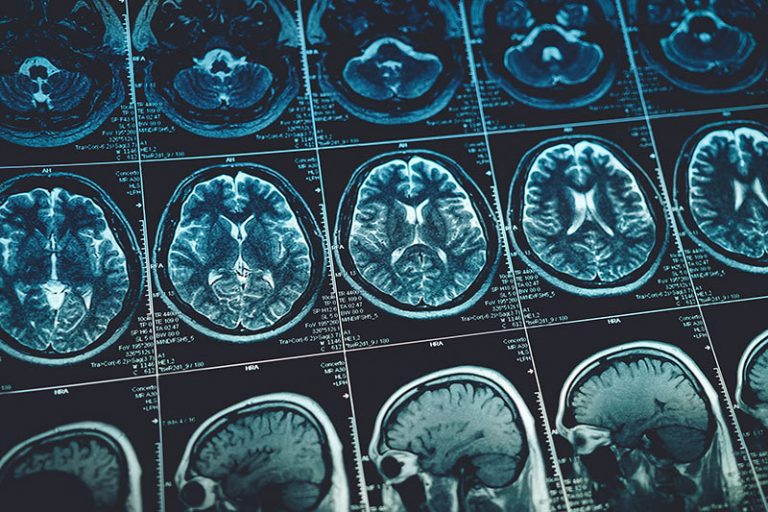More Information: September is Suicide Prevention Awareness Month, and September 10th is World Suicide Prevention Day.
Every year, more than 41,000 people die by suicide in the United States. During the month of September, you can help combat stigma and raise awareness about suicide and suicide prevention, connect with people you know impacted by suicide, raise awareness and share resources to help those at risk. You can also get involved on social media by sharing the infographic below using the hashtags #SuicidePrevention and #StigmaFree.
Learn more about suicide prevention, how our work is making a difference and access resources to help those who may be at risk.
How does our work help?
We’re the only nonprofit translational research organization with a dedicated focus on post-traumatic stress disorder (PTSD) and traumatic brain injury (TBI) research, which are both closely correlated with suicidal ideation and suicide. We have set an aggressive roadmap to ensure that precision diagnostics and targeted therapeutics are a focus of national efforts and milestone-driven research.
Learn about our research that is already making a difference
Discovering the biological underpinnings of PTSD
We co-sponsored, with the Psychiatric Genetics Consortium and Broad Institute, the largest genome-wide association study meta-analysis of PTSD to date. Using a multi-ethnic cohort that includes over 30,000 PTSD cases, 170,000 controls and is over ten times the size of any previous analysis, we discovered six genetic markers for PTSD risk. Our investment to drive the global coordination of this meta-analysis led to the discovery of genetic markers not previously associated with PTSD and confirmation there is a substantial genetic component to PTSD. Results from this study have significant implications for advancing our understanding of the pathophysiology of this debilitating syndrome and are critical to developing novel biologically-based treatment approaches. Learn more
Advancing personalized medicine for PTSD
We funded Stanford University to conduct the Biomarker Establishment for Superior Treatment (BEST) PTSD study, which uses resting-state MRI & electroencephalography (EEG) to identify clinical biomarkers and brain activity patterns or neural signatures in PTSD. This study uses neuroimaging and behavioral signatures to stratify PTSD patients into distinct subgroups based solely on the biological signature, or biotype. The analysis revealed that patients with a particular biotype may not respond to first- line PTSD treatments and behavioral therapy. These findings set the stage for future noninvasive brain stimulation approaches that will more quickly identify patients susceptible to developing PTSD and for treating patients with PTSD who are refractory to psychotherapy or first-line pharmacotherapy. Learn more
Our Commitment to Suicide Prevention Advocacy
Our advocacy efforts focus on building a national consensus for prioritizing research and activities that make precision diagnostics and targeted therapeutics a focus of policymakers and governmental leaders. By treating the underlying conditions that contribute to suicide and supporting an evidence-based roadmap to speed research solutions, we know we can make meaningful progress for combating the suicide epidemic.
Veterans Advisory Council
Our Veterans Advisory Council (VAC) includes senior leaders from Veteran Service Organizations, nonprofits, industry, government and families who have a deep personal commitment to Veterans’ concerns related to brain health. The VAC is committed to advancing suicide prevention by pursuing legislation and other measures to garner support and advance a comprehensive regimen of brain health research. Learn more
Advancing Suicide Prevention on the National Level
On March 5, 2019, the President’s Roadmap to Empower Veterans and End a National Tragedy of Suicide or PREVENTS was signed. We contributed recommendations for this roadmap, which will reduce suicide by empowering veterans to pursue an improved quality of life, prioritize research and establish collaboration across the public and private sectors. We will continue to strive for meaningful engagement with the PREVENTS Roadmap and push for suicide research that embodies data-driven approaches and best practices. View the roadmap
Taking Action
Over the past two years, we have helped lead efforts to advocate for a bill that aims to improve Veterans’ access to mental health care as well as make necessary investments into suicide prevention measures and support innovative mental health research. Learn more about our work as part of the Coalition to Heal Invisible Wounds and how you can support these efforts. Learn more
22 Jumps
U.S. Marine Veteran Tristan Wimmer lost his brother and fellow Marine to suicide in 2015 after he sustained a Traumatic Brain Injury (TBI) in Iraq and struggled with TBI for nearly a decade. In his memory, and to raise awareness and funds for TBI research and Veterans suicide prevention, Tristan completed 22 BASE jumps off Arizona’s Camelback Mountain. Learn more
Suicide Prevention Awareness Infographic
Suicide Prevention Resources
For Immediate Assistance
Learn More and Get Involved
Mental Health Resources during COVID-19
Resources for Veterans:
Resources for those living with Post-Traumatic Stress Disorder (PTSD), Traumatic Brain Injury (TBI) or mental illnesses:
Resources for healthcare workers, first responders and caregivers:
Find more information and resources on maintaining your mental health during COVID-19.
Infographic Sources:
- https://afsp.org/about-suicide/suicide-statistics/
- https://www.cdc.gov/violenceprevention/suicide/fastfact.html
- https://www.ncbi.nlm.nih.gov/pubmed/22483367
- https://journals.lww.com/headtraumarehab/Abstract/publishahead/Suicide_and_Traumatic_Brain_Injury_Among.99396.aspx
- https://www.cdc.gov/vitalsigns/suicide/infographic.html
- https://www.cdc.gov/violenceprevention/suicide/fastfact.html
- https://www.va.gov/opa/pressrel/pressrelease.cfm?id=4074
- https://www.cdc.gov/violenceprevention/suicide/fastfact.html
- https://afsp.org/our-work/advocacy/
- https://www.cdc.gov/violenceprevention/pdf/suicideTechnicalPackage.pdf
- https://www.cdc.gov/violenceprevention/pdf/suicideTechnicalPackage.pdf
- https://www.cdc.gov/violenceprevention/pdf/suicideTechnicalPackage.pdf
- http://ccare.stanford.edu/uncategorized/connectedness-health-the-science-of-social-connection-infographic/
- https://www.mind.org.uk/information-support/helping-someone-else/supporting-someone-who-feels-suicidal/how-to-help/#.XVbJ05NKjMU
- https://www.jedfoundation.org/wp-content/uploads/2016/07/help-a-friend-in-need-jed-facebook-instagram-guide-NEW.pdf




















